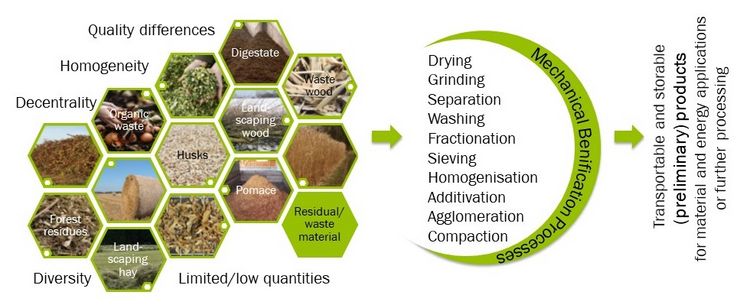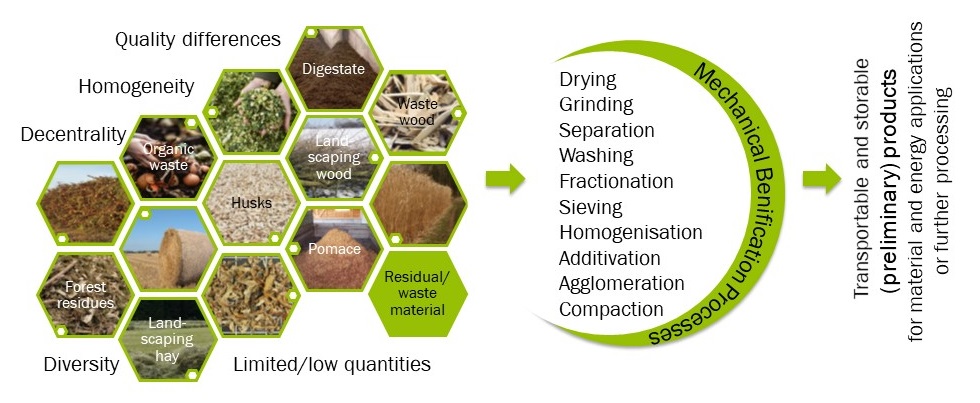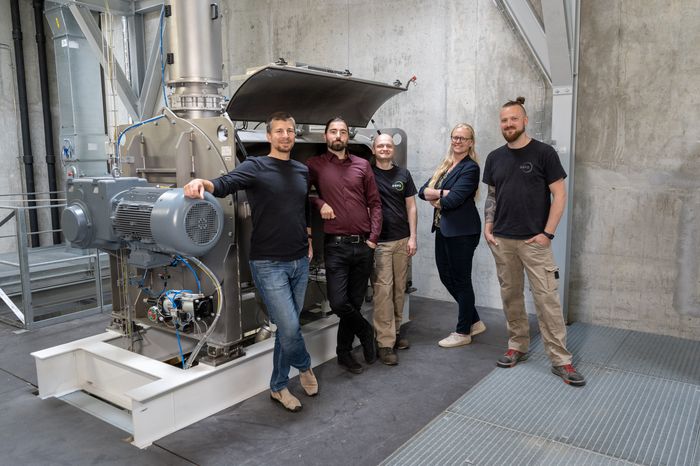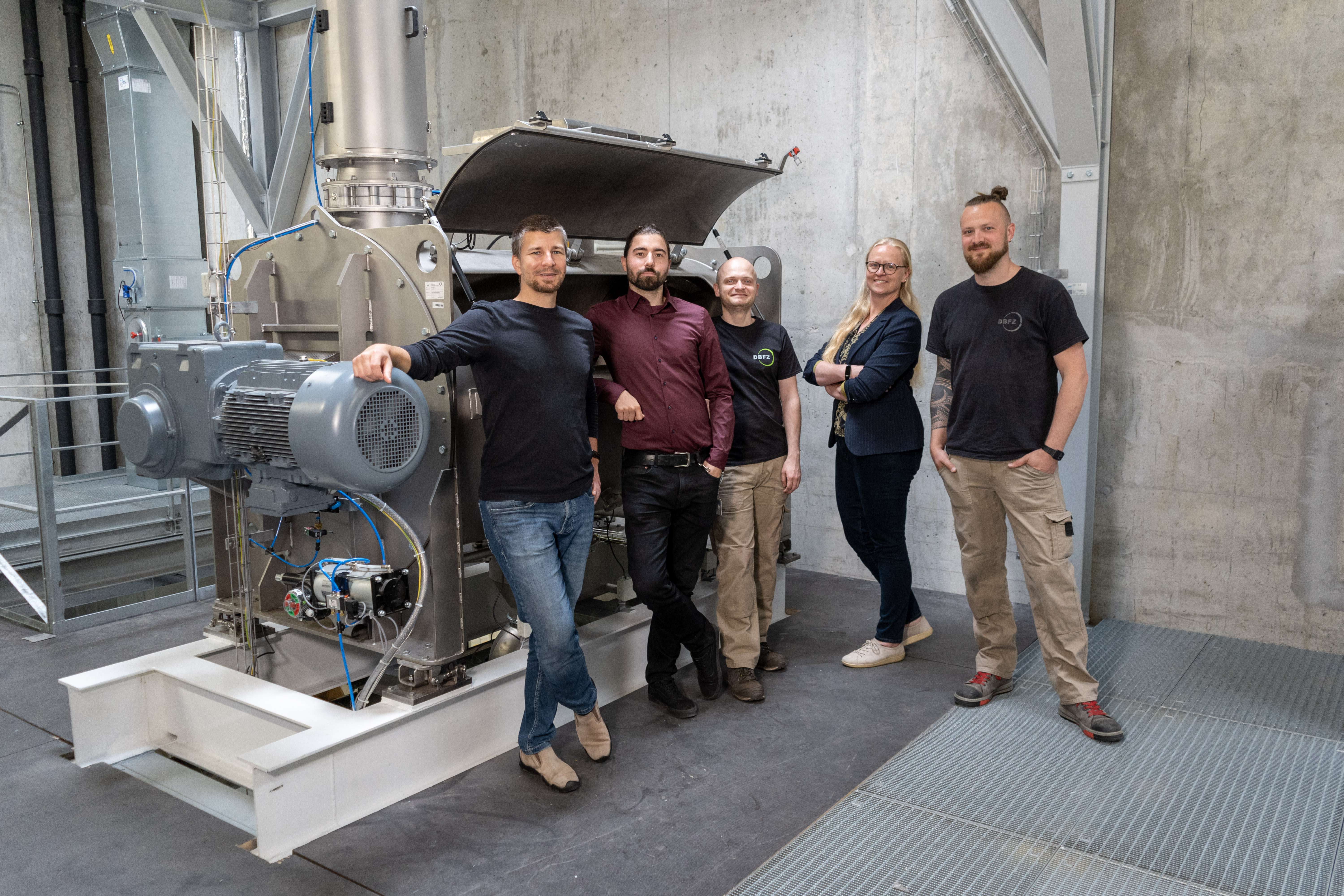The working group
We deal with all issues related to characterisation, processing and modification of biogenic solids, in particular biogenic residues and waste materials, for a wide range of applications. We develop homogeneous and solution-oriented qualities for natural challenges.
Focus topics of the working group:
- Processing of solid biomass and biogenic residues and waste materials into high-quality products
- Agglomeration of biogenic coals
- Implementation of preparation process steps such as comminution, drying, mixing and homogenisation as well as their process optimisation
- Implementation of compaction processes such as pelletisation, briquetting and granulation as well as the associated process optimisation
- Influencing the properties of solid biomass through conditioning and additives
- Modelling of compaction processes
- Investigations into binding mechanisms during the agglomeration of biogenic raw materials or coal
- Research and development of new alternative (mixed) fuels from biomass
- Development of a fuel database including combustion-relevant properties
- Legal issues regarding the termination of end-of-waste properties
- Market observation for the production of innovative material products from biogenic solids
The team
Teamwork is everything! We are an interdisciplinary team of scientists and employees in the laboratory and technical centre and we are always looking for interested partners. Get in touch with us!
Team science
After completing her studies in process engineering at the Technical University Bergakademie Freiberg, Dr Claudia Kirsten has been responsible for research and development of alternative and high-quality biomass solid fuels in the working group "Innovative Solid Fuels" since 2008. She has been involved in numerous national and international projects and is particularly concerned with optimising the product properties and production process of various agglomerates, such as pellets, briquettes and granulates from biogenic residues and waste materials. She is the scientific contact person for the processing and compaction technical centre at the DBFZ.
Since 2024, she has headed the newly established working group "Mechanical Benification Processes" and is also deputy head of the Thermo-chemical Conversion department.
Roman Adam studied environmental engineering and technology law at the Technical University Berakademie of Freiberg. Since 2018, he has been working as a research assistant and doctoral candidate at the DBFZ in the Thermo-chemical Conversion Department, first in the working group "Innovative Solid Fuels" and now in the working group "Mechanical Benification Processes". His research focuses on the evaluation and design of aspects relating to waste and immission control law. He also conducts research using experiments and DEM simulations on the pelletisation and briquetting of biogenic raw materials as well as residual and waste materials.
Nikolaus Manolikakes achieved a bachelor’s degree in packaging technology at Munich University of Applied Sciences. He continued his study at the HTWK Leipzig, absolving with a master’s degree in printing an packaging technology. Since 2023, he has been working as a researcher and doctoral candidate at the DBFZ in the Thermo-chemical Conversion Department, first in the working group "Innovative Solid Fuels", now in the working group "Mechanical Benification Processes". His research focuses on the processing and benification of pyrogenic carbons and iron ores with a focus on granulation on the process side.
Mareike Meyer is a biochemist and studied for her bachelor's and master's degrees at the University of Leipzig with the focus on biotechnology/environmental biochemistry. Since 2025, she is a research assistant at the DBFZ in the department of thermochemical conversion. In the working group "Mechanical Benification Processes" her work includes processing techniques for non-woody biomass (e.g. paludiculture). She combines technical product development with the development of tailored business models in order to pave the way to market for bioeconomy products.
Team technical centre/laboratory
Christoph Kröhl is a qualified mechatronics engineer and has been working on various projects in the department of thermo-chemical conversion since 2017. His project work focuses on assisting in the production of test fuels, fuel approval and cooperation projects with African institutes. As a test engineer, he primarily conducts pelletising and granulation tests, each involving material pre-treatment such as grinding, mixing or drying, as well as post-treatment processes such as sieving or fractionation and the determination of physical and mechanical product properties. The range of materials to be examined extends from wood and straw-like raw materials to biochar. He is trained in sampling according to LAGA PN 98 and regularly takes representative analysis samples from partners.
Raphael Dürrse is a qualified cutting machine operator and machine technician and has been working as a technician in the department of thermo-chemical conversion since 2021. His tasks include operating various machines for grinding, mixing and compacting woody and herbaceous biomass and performing mechanical analyses of the products. Thanks to his CAD skills, he has also designed and built devices that are used in the department.



